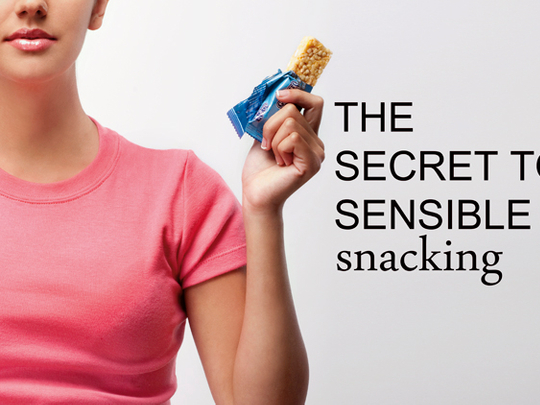
When was the last time you were really hungry? If you’re even a little bit aware of modern nutrition advice you’ll know that eating small meals often – or ‘grazing’ – is the number one tip for keeping your blood sugar stable and your weight in check. It’s why we’ve obediently started stocking up on snacks, reaching for a handful of nuts or a muesli bar as soon as our tummies whisper the slightest rumble.
While it’s true that a stable blood-sugar level is key to avoiding those roller-coaster-style energy dips and keeping your body running efficiently, research suggests that we may have taken the grazing concept a little too far. “A snack is something that we eat between our three meals – breakfast, lunch and dinner,” explains Abu Dhabi-based nutritionist Sarah Queen. “The meals have a clear, defined meaning to many of us about what they should contain, whereas grazing does not have any clarity so it is much easier for people to over consume and make the wrong food choices.”
It’s a valid point, especially as one recent survey found that 42 per cent of office workers stacked on up to 6kg in just one year due to their desk-bound munching habits. “The main problem is that people snack on high-saturated-fat and high-sugar foods. These can be laden with calories and contain very little nutritional value,” warns Sarah.
The other catch is that humans are designed to be able to withstand periods of fasting. In fact, our hormones are specifically created to manage this. When you don’t eat, the hormone glucagon is released to mobilise energy from food we've eaten, while grazing constantly produces insulin, which can lead to fat storage. And chronic high insulin is a risk factor for many diseases, including heart problems.
So where do you draw the line when it comes to snacking? The answer, of course, is somewhere in the middle. Just grazing all day is unhealthy as are long periods without food, as this can raise the stress hormone cortisol, which also promotes fat storage and causes blood pressure to spike. For this reason, when you eat can be just as important as what you eat when it comes to weight. For example, new research by the Salk Institute for Biological Studies in the US shows that if you’re still snacking at night, the disruption to your body clock could lead to weight gain – even if you’re not eating more calories than usual.
BALANCING ACT
Ultimately the ideal eating plan is still built around three well-balanced meals and two balanced snacks a day at sensible hours. And when we say balanced, that means that all meals and snacks should contain the correct portions of protein, carbs and good fats to keep blood sugar steady and fuel your body, as well as enabling it to build and repair effectively. “Always ensure that you have your breakfast, lunch and evening meal and then have a mid-morning and mid-afternoon snack from the following foods: a portion of fruit, vegetables, a level handful of unsalted nuts or mixed nuts and seeds, a slice of wholemeal toast or a couple of rice cakes with a thin spread of nut butter, hummus or plain yoghurt,” says Sarah.
Think of your snacks as your plug between long meals rather than as a way to break up a boring day at work or a treat to cheer you up. Gaps between meals and snacks shouldn’t exceed four hours: if you have breakfast at 7am, eat a snack at 10am and lunch at 1pm, then follow it up with an afternoon snack at 4pm and dinner between 7pm and 8pm. And if after that you’re still craving a little something more, try our top tips for keeping that pesky munching at bay.
Stomach growling? Fill up on protein
The problem with classic snack foods is they tend to be carb and fat heavy but contain very little protein, which you need to feel satiated. Try these options for a healthy, filling fix.
- Low-fat yoghurt: Try a dollop of yoghurt with some fresh berries
- Hummus: Great with veggies or oatcakes
- Vegetable sticks: Dip crudities into cottage cheese or hummus











